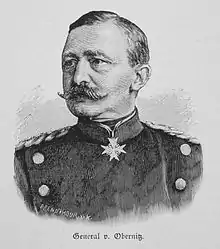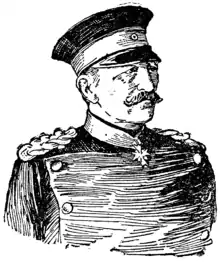Hugo von Obernitz
Hugo Moritz Anton Heinrich Freiherr[lower-alpha 1] von Obernitz (born April 16, 1819; died September 18, 1901, in Honnef) was a Prussian general who served as adjutant general of Kaiser Wilhelm I.
Freiherr Hugo von Obernitz | |
|---|---|
 | |
| Born | April 16, 1819 Bischofswerder, West Prussia, Prussia |
| Died | September 18, 1901 (aged 83) Bad Honnef, Rhine Province, German Empire |
| Buried | Alter Friedhof cemetery |
| Allegiance | |
| Service/ | |
| Years of service | 1836-1888 |
| Rank | General of the Infantry |
| Commands held | XIV Corps |
| Battles/wars | Austro-Prussian War |
| Awards | Order of the Black Eagle Pour le Merite Friedrich Order Order of St. George |
Biography
Hugo was the son of the Prussian Major Friedrich Karl Moritz von Obernitz and his wife Wilhelmine.[1]
After attending cadet schools in Kulm and Berlin, Obernitz entered the 4th Infantry Regiment on August 18, 1836, as a second lieutenant. In 1852 he became captain and in 1856 he was promoted to major. In June 1861 he was promoted to lieutenant colonel and from the spring of 1863 he was commander of the Guards Fusilier Regiment. On June 6, 1865, he was appointed a member of the study commission of the war academy in Berlin. During the Austro-Prussian War, he led the 1st Guards Infantry Brigade as part of the 2nd Army in the battles of Soor and Königinhof against the Austrians. In the decisive Battle of Königgrätz on July 3, his troops captured 40 cannons and the town of Chlum. For this, Obernitz was awarded the Pour le Mérite in September 1866 and was promoted to major general. From 1868 to 1871 he was an inspector of hunters and marksmen.

On September 29, 1866, Obernitz was promoted to major general. From 1868 to 1871 he was a military inspector.
He was commander of the Württemberg Field Division in the Franco-Prussian War, fighting in the Battle of Wörth and, as part of the II Corps under the command of General Eduard von Fransecky, participated in the Siege of Paris. Obernitz received a grant of 100,000 Thalers for these services. On October 22, 1871, he became commander of the 14th Division in Düsseldorf. On June 11, 1879, he was appointed commander of the XIV Corps in Karlsruhe.[2] Meanwhile, in June 1879 he was promoted to General of the Infantry and on March 22, 1884, he was appointed chief of the 4th (3rd East Prussian) Grenadier Regiment "King Frederick the Great". On August 18, 1886, he celebrated his fiftieth anniversary of service.
After his retirement in 1888, he and his wife Anna Friederike Ida Bertha, née von Usedom, bought a villa in Bad Honnef. They had several children, among them:
- Friedrich Wilhelm Viktor Moritz Ferdinand (1860-1909) - Prussian statesman;
- Arthur Rudolf Eduard (born 1873) - Prussian military major.
Hugo von Obernitz died on September 18, 1901, in Bad Honnef and was buried in the Alter Friedhof cemetery. Later, his wife was buried next to him. In the cemetery you can still see the tombstone of Hugo von Obernitz, whose bronze Prussian eagle was stolen in 1988.
Honours and awards
.svg.png.webp) Kingdom of Prussia:[3]
Kingdom of Prussia:[3]
- Knight of the Prussian Crown, 3rd Class, 14 January 1865[4]
- Pour le Mérite (military), 20 September 1866[4]
- Service Award Cross
- Iron Cross (1870), 1st Class with 2nd Class on Black Band[5]
- Knight of the Red Eagle, 2nd Class with Star, Oak Leaves and Swords, 1871; 1st Class with Swords on Ring, 18 January 1874;[6] Grand Cross, 22 March 1880[4]
- Grand Commander's Cross of the Royal House Order of Hohenzollern, 8 September 1877[4]
- Knight of the Black Eagle, 16 September 1885;[4] with Collar
 Austrian Empire:[7]
Austrian Empire:[7]
- Knight of the Iron Crown, 2nd Class, 1862
- Commander of the Imperial Order of Leopold, 1864
.svg.png.webp) Baden:[8]
Baden:[8]
- Grand Cross of the Zähringer Lion, 1880
- Knight of the House Order of Fidelity, 1886

 Lippe:[3]
Lippe:[3]
- Cross of Honour of the House Order of Lippe, 1st Class with Swords
- Military Merit Medal (Schaumburg-Lippe)
 Mecklenburg:[3]
Mecklenburg:[3]
- Grand Cross of the Wendish Crown, with Golden Crown
- Military Merit Cross, 1st Class (Schwerin)
 Russian Empire:[3]
Russian Empire:[3]
- Knight of St. George, 4th Class, February 1871
- Knight of the White Eagle
.svg.png.webp) Kingdom of Saxony:[9]
Kingdom of Saxony:[9]
- Grand Cross of the Albert Order, 1868
- Commander of the Military Order of St. Henry, 2nd Class, 1871
.svg.png.webp) Beylik of Tunis: Grand Officer of the Order of Glory[3]
Beylik of Tunis: Grand Officer of the Order of Glory[3] Württemberg:[10]
Württemberg:[10]
- Grand Cross of the Friedrich Order, 1868
- Grand Cross of the Military Merit Order, 28 December 1870
Notes
References
- Hugo Moritz Anton Freiherr von Obernitz
- Hugo von Obernitz
- Handbuch über den Königlich Preußischen Hof und Staat fur das jahr 1901, p. 40
- "Königlich Preussische Ordensliste", Preussische Ordens-Liste (in German), Berlin, 1: 9, 12, 26, 642, 935, 1886 – via hathitrust.org
- "Königlich Preussische Ordensliste", Preussische Ordens-Liste (in German), Berlin, 3: 29, 1877 – via hathitrust.org
- "Rother Adler-orden", Königlich Preussische Ordensliste (in German), vol. 1, Berlin, 1877, p. 53 – via hathitrust.org
{{citation}}: CS1 maint: location missing publisher (link) - "Ritter-Orden", Hof- und Staatshandbuch der Österreichisch-Ungarischen Monarchie, 1901, pp. 71, 100, retrieved 10 October 2021
- Hof- und Staats-Handbuch des Großherzogtum Baden (1896), "Großherzogliche Orden" pp. 64, 78
- Sachsen (1901). "Königlich Orden". Staatshandbuch für den Königreich Sachsen: 1901. Dresden: Heinrich. pp. 8, 161 – via hathitrust.org.
- Hof- und Staats-Handbuch des Königreich Württemberg (1896), "Königliche Orden" pp. 66, 96
Sources
- Hugo von Obernitz, General, Kommandeur der Württ.
- Kurt von Priesdorff: Soldatisches Führertum, Band 8, Hanseatische Verlagsanstalt Hamburg, S. 69–73.
- "The siege operations in the campaign against France, 1870-71."
- Stuttgarter Ehrenbürger von 1850 bis 1900 Archived 2013-09-05 at the Wayback Machine